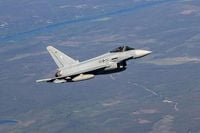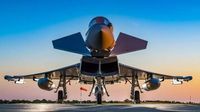On April 17, 2025, the German government, led by a caretaker coalition of Social Democrats and Greens, blocked the export of approximately three dozen Eurofighter Typhoon fighter jets to Turkey, according to the German newspaper Handelsblatt, citing local sources. The move, driven by concerns over the recent arrest of Turkish opposition leader Ekrem İmamoğlu, has sent ripples through NATO, the European defense industry, and the volatile geopolitics of the Eastern Mediterranean.
Berlin cited the detention of İmamoğlu, a prominent rival to Turkish President Recep Tayyip Erdoğan accused of corruption in what the Turkish opposition calls a politically motivated plot, as a key factor in the veto. German officials labeled Erdoğan’s actions an "assault on Turkish democracy," arguing that approving the arms deal would be inappropriate under these circumstances.
This decision, which reverses earlier progress toward the sale, not only jeopardizes Turkey’s military modernization but also strains the unity of the Eurofighter consortium and raises questions about Ankara’s role in NATO’s southern flank. The Eurofighter Typhoon, a twin-engine, multirole fighter jet, is a cornerstone of European aerospace engineering, designed to compete with the world’s most advanced combat aircraft.
Developed by a consortium of Germany, the United Kingdom, Italy, and Spain through companies like Airbus, BAE Systems, and Leonardo, the Typhoon is a 4.5-generation fighter renowned for its agility, advanced avionics, and versatility. With a top speed of Mach 2, a combat radius of over 1,800 miles, and the ability to carry a diverse payload—including Meteor beyond-visual-range air-to-air missiles and Paveway IV precision-guided bombs—the Typhoon excels in air superiority, ground attack, and reconnaissance missions.
Since its operational debut in 2003, the Typhoon has been deployed by European air forces in conflicts from Libya to Syria, proving its reliability in high-intensity operations. For Turkey, acquiring the Typhoon was seen as a critical step to bolster its aging air force, particularly after being excluded from the U.S.-led F-35 program due to its purchase of Russian S-400 air defense systems in 2019.
Turkey’s air force, one of the largest in NATO, relies heavily on a fleet of over 200 F-16 Fighting Falcons, many of which are decades old and require modernization or replacement. The loss of access to the F-35, a stealth fighter designed for network-centric warfare, left a significant gap in Ankara’s ability to maintain air superiority in contested regions like the Aegean Sea, where tensions with Greece persist, and the Black Sea, where Russia’s military presence remains a concern.
The Eurofighter was poised to fill this void, offering advanced capabilities to counter threats from modern adversaries. Without the Typhoon, Turkey faces a precarious situation. Its F-16s, while still potent, lack the cutting-edge sensors and stealth features of fifth-generation fighters like the F-35 or Russia’s Su-57. Upgrading the F-16 fleet with new avionics and weapons, as Turkey has done in recent years, can only extend their viability so far.
The German veto thus places immediate pressure on Turkey’s air force to find alternatives, a task complicated by geopolitical and technical constraints. Ankara has been developing its own fifth-generation fighter, the TF-X (now called Kaan), under the Turkish Aerospace Industries (TUSAŞ). Unveiled in 2023, the Kaan aims to rival advanced platforms like the F-35, with stealth features, supercruise capability, and indigenous avionics.
However, the program is years away from operational readiness, with projections suggesting deployment no earlier than the early 2030s. Technical challenges, including engine development and integration of complex systems, have slowed progress, and Turkey’s limited experience in building advanced fighters raises doubts about meeting these timelines. Relying on the Kaan as a near-term solution is unrealistic, leaving Turkey vulnerable in a region where air power is critical.
Other potential suppliers, such as Russia with its Su-57 or China with the J-20, are unlikely options due to Turkey’s NATO membership and the incompatibility of non-Western systems with alliance standards. The Su-57, for instance, has faced production delays and lacks the proven combat record of Western fighters, while the J-20’s export potential remains uncertain. Any move toward Russian or Chinese platforms would also risk further alienating NATO allies, a path Ankara has tread cautiously since the S-400 fallout.
The German decision has also exposed fault lines within the Eurofighter consortium, a collaborative effort that has long balanced national interests with collective goals. The United Kingdom and Spain, eager to secure the deal for economic reasons, have pushed for the sale, with BAE Systems and Airbus standing to gain significant revenue from the estimated $5 billion contract. Italy, while less vocal, has also supported the export.
Germany’s veto, rooted in its restrictive arms export policies, has frustrated its partners, who see the decision as prioritizing domestic politics over industrial and strategic interests. Handelsblatt reported that German Chancellor Olaf Scholz, who is serving in a caretaker capacity following the collapse of the coalition government, had previously worked to ease concerns about the sale during confidential talks with Erdoğan. As recently as October 2024, Scholz defended arms exports to Turkey, stating, "Turkey is a member of NATO, and therefore there are decisions from us that lead to concrete deliveries," according to aero.de.
The abrupt reversal, triggered by İmamoğlu’s arrest, has undone months of progress and highlighted the fragility of the consortium’s decision-making process, which requires unanimous approval for exports. Germany’s arms export policy has a history of complicating international deals. In 2018, Berlin imposed a partial embargo on arms sales to Saudi Arabia over its involvement in the Yemen conflict, delaying Eurofighter deliveries and straining relations with the UK and France.
Similar restrictions have been applied to Turkey, particularly after the failed 2016 coup attempt, when Germany rejected 11 arms deals in 2017, as noted by Frankfurter Allgemeine Zeitung. The current veto reflects Berlin’s sensitivity to human rights and democratic backsliding, issues that have long colored its relationship with Ankara.
Critics argue that Germany’s stance risks undermining NATO cohesion, especially at a time when Russia’s aggression in Ukraine and instability in the Middle East demand a united front. Supporters, however, contend that enabling Erdoğan’s government with advanced weaponry could embolden further authoritarianism, a view echoed in Berlin’s condemnation of the İmamoğlu arrest as a "political conspiracy," per Handelsblatt.
The veto’s implications extend beyond Turkey’s borders, affecting NATO’s strategic posture and the balance of power in the Eastern Mediterranean. Turkey is a linchpin in the alliance’s southern flank, hosting critical bases like İncirlik and maintaining a robust military presence in Syria, Libya, and the Caucasus.
A weakened Turkish air force could limit NATO’s ability to project power in these regions, particularly against Russian-backed forces in Syria or Iran-aligned militias in Iraq. In the Aegean, where Greece is upgrading its air force with French Rafale jets and U.S. F-35s, Turkey’s inability to modernize risks tilting the regional balance.
Greece’s Rafale, a 4.5-generation fighter comparable to the Typhoon, boasts advanced radar and long-range missiles, giving Athens an edge in potential confrontations. The F-35, with its stealth and sensor fusion, further widens this gap. Without a modern fighter, Turkey may struggle to deter Greek assertiveness or maintain its claims over disputed maritime zones.
Historically, Turkey’s air force has played a pivotal role in regional conflicts. During the 1974 Cyprus invasion, Turkish F-100 Super Sabres and F-104 Starfighters provided air cover for ground operations, securing a foothold on the island. In recent years, Turkish F-16s have conducted strikes against Kurdish militias in Syria and Iraq, demonstrating Ankara’s willingness to use air power to shape regional outcomes.
The Eurofighter would have enhanced these capabilities, enabling precision strikes and air dominance in contested environments. Its absence forces Turkey to rely on older platforms, potentially reducing its operational flexibility and deterrence capacity. This is particularly concerning in Syria, where Russian Su-35s and S-400 systems pose a direct threat, and in Libya, where Turkey’s air support has been crucial for the Tripoli-based government.
The veto also has domestic ramifications in Turkey. Erdoğan, a master of political maneuvering, may leverage the German decision to rally nationalist sentiment, portraying Turkey as a victim of Western double standards. This narrative has proven effective in past disputes, such as the S-400 controversy, when Erdoğan framed U.S. sanctions as an attack on Turkish sovereignty.
By casting Germany’s veto as punishment for pursuing an independent path, Erdoğan could deflect attention from domestic challenges, including economic woes and the İmamoğlu case. The opposition, meanwhile, has seized on the arrest to accuse Erdoğan of stifling democracy, a charge that resonates with Western capitals.
The German veto, while intended to signal disapproval, may inadvertently strengthen Erdoğan’s grip by giving him a foreign adversary to vilify. For the Eurofighter consortium, the veto underscores the challenges of aligning national priorities in a competitive global arms market.
The Typhoon faces stiff competition from the U.S. F-35, which has secured orders from over a dozen countries, and France’s Rafale, which has won contracts in Greece, Egypt, and India. Losing the Turkish deal could weaken the consortium’s position, particularly as it seeks to extend the Typhoon’s production line beyond 2030.
Airbus has warned that without new orders, its Manching facility in Germany risks closure, a concern raised by 3,000 workers at a 2023 rally, according to Flug Revue. The UK, which has taken the lead in negotiations with Turkey, may push for reforms to the consortium’s export rules, potentially reducing Germany’s veto power.
Such a move would mark a significant shift in European defense cooperation, with implications for future projects like the Future Combat Air System (FCAS). The broader arms market is also affected. The U.S., which approved F-16 sales to Turkey in early 2024, may see an opportunity to deepen its influence in Ankara, though Washington remains wary of Turkey’s flirtations with Russia.
France, eager to capitalize on Turkey’s predicament, could offer the Rafale as an alternative, though its high cost and Turkey’s strained ties with Paris make this unlikely. Russia and China, while potential suppliers face barriers due to NATO interoperability and political risks. The global fighter market is increasingly crowded, with South Korea’s KF-21 and India’s AMCA entering the fray, but none offer Turkey a viable near-term solution.
The Typhoon’s blend of performance, availability, and NATO compatibility made it uniquely suited to Ankara’s needs, rendering Germany’s veto a significant setback. From a NATO perspective, the veto risks alienating a key ally at a critical juncture. Turkey’s strategic location, bridging Europe and the Middle East, makes it indispensable for countering Russian influence and securing energy routes.
Yet, repeated Western rebuffs—first the F-35 exclusion, now the Eurofighter veto—could push Ankara toward a more autonomous or non-aligned stance. While Turkey is unlikely to abandon NATO, closer ties with Moscow or Beijing would complicate alliance dynamics.
The S-400 purchase already strained trust, prompting U.S. sanctions under the Countering America’s Adversaries Through Sanctions Act (CAATSA). Further misalignment could weaken NATO’s cohesion, particularly as it faces challenges from an assertive Russia and a rising China. The German veto also reflects broader trends in European arms export policies.
Berlin’s emphasis on human rights often clashes with the pragmatic approaches of its allies, as seen in disputes over Saudi Arabia and Egypt. While Germany’s stance may resonate with domestic voters, it risks ceding market share to competitors like the U.S. and France, whose export policies are less restrictive. The Eurofighter’s success depends on collective agreement, and Germany’s repeated vetoes could erode trust among consortium partners.
The UK, which has secured Typhoon sales to Qatar and Oman, may seek greater autonomy in future deals, potentially fracturing the European defense industry. Looking ahead, the veto leaves Turkey, NATO, and the Eurofighter consortium at a crossroads.
Ankara must now weigh its options: double down on the Kaan, seek a workaround with the UK and Spain, or pivot to less reliable suppliers. The consortium faces pressure to resolve its internal divisions, while NATO must navigate the delicate task of keeping Turkey engaged without endorsing Erdoğan’s domestic policies.
Germany’s decision, while grounded in principle, may have unintended consequences, from weakening a key ally to destabilizing a volatile region. The path forward is uncertain, and much depends on whether Berlin’s caretaker government—or its successor—reconsiders its stance. Could a shift in German policy salvage the deal, or has the veto set in motion a chain of events that will reshape NATO’s southern flank? Only time will tell, but the stakes could not be higher.






